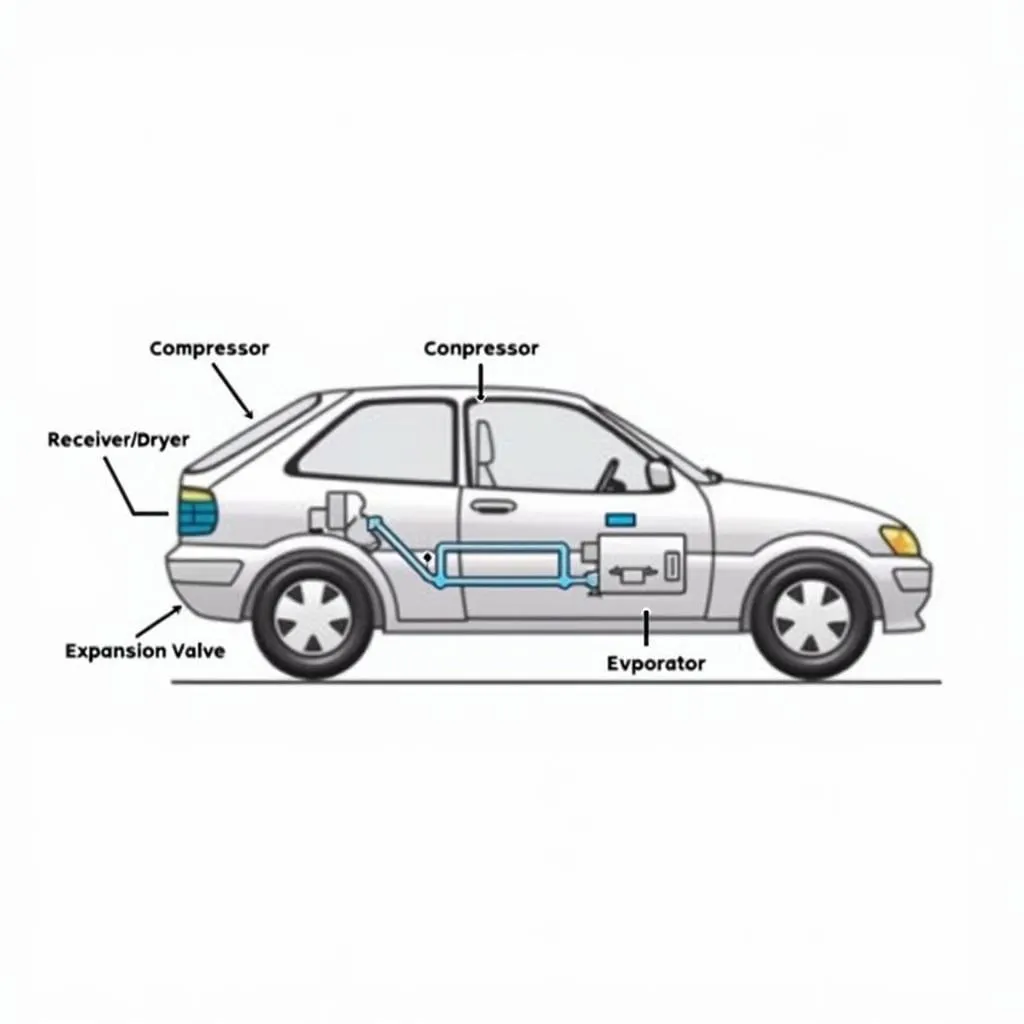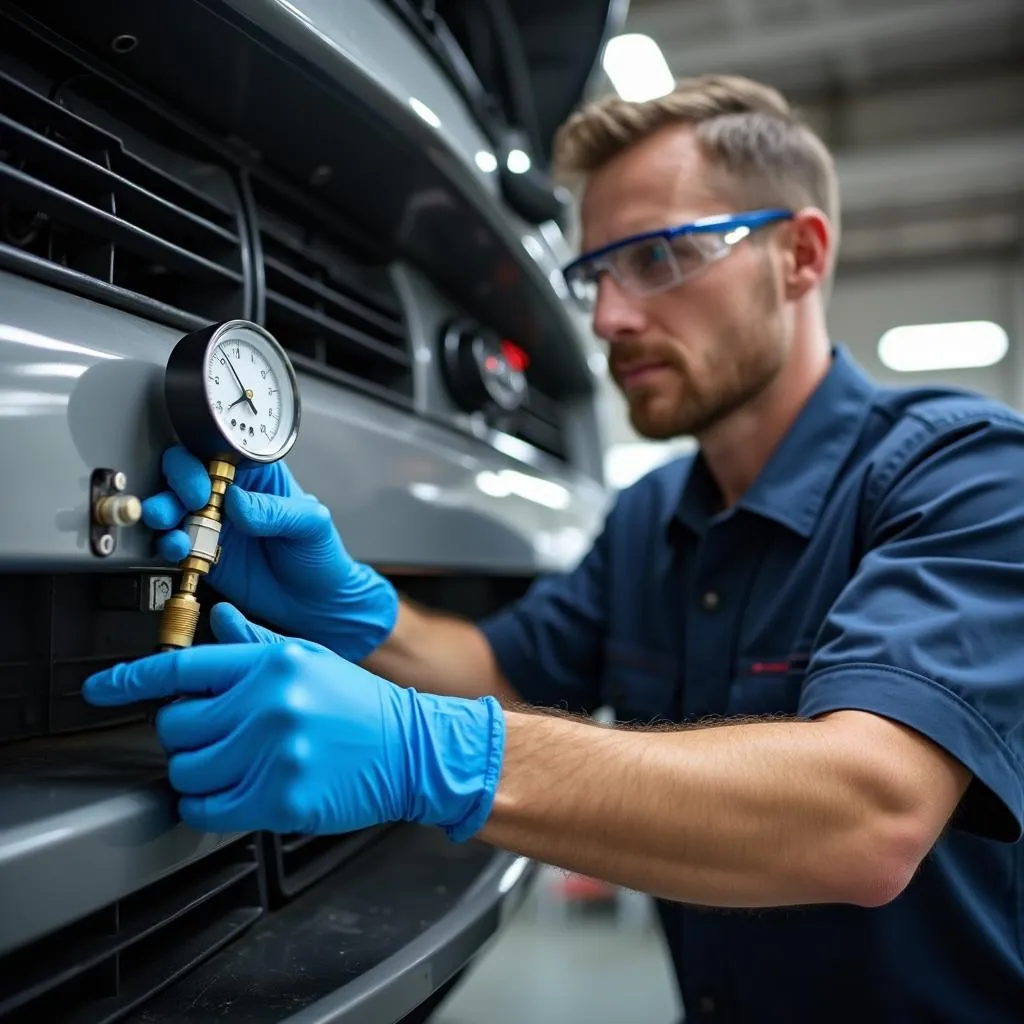When temperatures soar, the last thing you want is for your car’s air conditioning to fail. Regular A/c Service Auto ensures your comfort during scorching summer drives and helps maintain your vehicle’s value. This comprehensive guide covers everything you need to know about a/c service auto, from understanding the basics to finding reputable service providers.
Understanding Your Car’s A/C System
Your car’s A/C system is more complex than it seems. It’s not just about blowing cold air; it involves a network of components working together to cool and dehumidify the air inside your vehicle.
The key components include:
- Compressor: This is the heart of the system, compressing refrigerant gas and circulating it through the system.
- Condenser: Similar to a radiator, the condenser cools the refrigerant gas, converting it from a high-pressure gas to a high-pressure liquid.
- Receiver/Dryer: This component removes moisture from the refrigerant and stores it.
- Expansion Valve: The expansion valve regulates the flow of refrigerant into the evaporator.
- Evaporator: This is where the magic happens. The refrigerant absorbs heat from the cabin air as it evaporates, cooling the air blown into your car.
 Car A/C System Diagram
Car A/C System Diagram
Common A/C Problems and Their Causes
Several issues can plague your car’s A/C system, leading to reduced cooling efficiency or complete failure. Here are some of the most common problems:
- Low Refrigerant: Refrigerant is the lifeblood of your A/C system. Leaks are a common culprit for low refrigerant levels, leading to poor cooling.
- Compressor Failure: The compressor can fail due to age, wear and tear, or lack of lubrication.
- Electrical Issues: Faulty wiring, blown fuses, or a malfunctioning A/C control module can disrupt the electrical signals required for the system to operate.
- Clogged Condenser: Debris, dirt, and insects can accumulate on the condenser, obstructing airflow and reducing cooling efficiency.
- Evaporator Problems: A leak in the evaporator or a blockage can prevent it from effectively absorbing heat.
 Mechanic Inspecting Car A/C System
Mechanic Inspecting Car A/C System
When Does Your Car Need A/C Service?
Regular a/c service auto is crucial for maintaining optimal performance and preventing costly repairs. Here are signs your car’s A/C system needs attention:
- Weak Airflow: If the air coming from your vents is weak, it could indicate a problem with the blower motor or a blockage in the system.
- Warm Air: This is an obvious sign that your A/C system is not functioning correctly.
- Strange Noises: Unusual noises like hissing, grinding, or clicking when the A/C is on can indicate compressor issues or problems with the system’s belts or pulleys.
- Foul Odors: Musty or unpleasant smells coming from the vents can indicate mold or mildew growth within the system.
What Does an A/C Service Auto Entail?
A typical a/c service auto may include the following:
- System Inspection: A thorough inspection of all components to identify leaks, damage, or wear and tear.
- Refrigerant Recharge: If the refrigerant level is low, the system will be evacuated and recharged with the appropriate amount and type of refrigerant.
- Leak Detection and Repair: If a leak is detected, it will be repaired, and the system will be retested.
- Component Replacement: Worn or damaged components, such as the compressor, condenser, or evaporator, may need replacement.
- System Cleaning: Cleaning the condenser and evaporator can improve cooling efficiency.
 Car A/C Service Checklist
Car A/C Service Checklist
Finding a Reputable A/C Service Center
Choosing a qualified and trustworthy mechanic is essential for proper a/c service auto. Here are some factors to consider:
- Certifications: Look for ASE-certified technicians who specialize in automotive air conditioning.
- Experience: Choose a shop with a proven track record of providing quality A/C services.
- Equipment: Ensure the shop uses modern diagnostic equipment and tools.
- Reviews: Check online reviews and ask for recommendations from friends or family.
- Warranty: Inquire about warranties on parts and labor.
where do i place service ports on auto a/c
A/C Maintenance Tips
Proactive maintenance can prolong the life of your car’s A/C system and prevent unexpected breakdowns.
- Regularly Run Your A/C: Even during cooler months, run your A/C for a few minutes every couple of weeks to keep the refrigerant circulating and lubricate the system’s components.
- Keep it Clean: Regularly clean the area around the condenser, removing debris and leaves to ensure proper airflow.
- Check for Leaks: Be vigilant for signs of refrigerant leaks, such as oily residue under the car or a sweet smell inside the cabin.
- Schedule Inspections: Have your car’s A/C system inspected annually by a qualified mechanic.
Conclusion
A properly functioning A/C system is essential for comfortable and enjoyable driving, especially during summer. Regular a/c service auto not only ensures optimal cooling but also helps prevent costly repairs down the road. By understanding your car’s A/C system, recognizing potential problems, and following these maintenance tips, you can keep your cool all year round.
FAQs about A/C Service Auto
1. How often should I recharge my car’s A/C?
Ideally, you shouldn’t need to recharge your car’s A/C frequently. A well-maintained system should hold its refrigerant charge for several years. If you notice your A/C isn’t cooling as effectively, it’s best to have a professional inspect the system for leaks before recharging.
2. Can I service my car’s A/C myself?
While some maintenance tasks, like cleaning the condenser, can be done at home, it’s best to leave A/C service to professionals. A/C systems operate under high pressure and require specialized knowledge and equipment to service safely and correctly.
3. How much does a/c service auto cost?
The cost of a/c service auto can vary depending on the type of service needed, the make and model of your vehicle, and the labor rates in your area.
a z auto service center newark
4. How can I prevent bad smells from my car’s A/C?
Musty smells often indicate mold or mildew growth in the evaporator. Regularly running your A/C, even in winter, can help prevent moisture buildup. You can also use specialized A/C cleaners to eliminate existing odors and prevent future growth.
5. What type of refrigerant does my car use?
The type of refrigerant your car uses depends on its make, model, and year. You can usually find this information in your owner’s manual or on a sticker under the hood.
6. How long does it take to service a car’s A/C?
The time required for a/c service auto depends on the complexity of the issue. A simple refrigerant recharge may take an hour or less, while more involved repairs could take several hours or even require leaving your car overnight.
will's auto service battle creek mi
7. What are the signs of a failing A/C compressor?
Common signs of a failing A/C compressor include loud noises coming from the engine bay when the A/C is on, reduced cooling performance, and a noticeable drop in engine power when the A/C is engaged.
If you notice any of these symptoms, it’s crucial to have your A/C system inspected by a qualified mechanic as soon as possible to prevent further damage and potentially costly repairs. For all your a/c service auto needs, remember to consult with a trusted professional and keep your car’s cooling system in peak condition for a comfortable and enjoyable driving experience.


